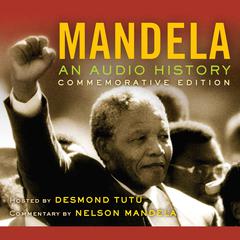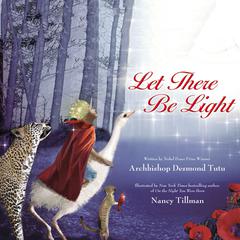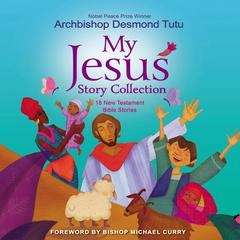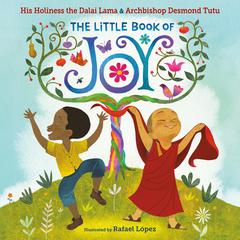 Play Audiobook Sample
Play Audiobook Sample
The Book of Forgiving: The Fourfold Path for Healing Ourselves and Our World Audiobook
 Play Audiobook Sample
Play Audiobook Sample
Quick Stats About this Audiobook
Total Audiobook Chapters:
Longest Chapter Length:
Shortest Chapter Length:
Average Chapter Length:
Audiobooks by this Author:
Publisher Description
Archbishop Desmond Tutu, Nobel Peace Prize winner, Chair of The Elders, and Chair of South Africa’s Truth and Reconciliation Commission, along with his daughter, the Reverend Mpho Tutu, offer a manual on the art of forgiveness—helping us to realize that we are all capable of healing and transformation.
Tutu's role as the Chair of the Truth and Reconciliation Commission taught him much about forgiveness. If you asked anyone what they thought was going to happen to South Africa after apartheid, almost universally it was predicted that the country would be devastated by a comprehensive bloodbath. Yet, instead of revenge and retribution, this new nation chose to tread the difficult path of confession, forgiveness, and reconciliation.
Each of us has a deep need to forgive and to be forgiven. After much reflection on the process of forgiveness, Tutu has seen that there are four important steps to healing: Admitting the wrong and acknowledging the harm; Telling one's story and witnessing the anguish; Asking for forgiveness and granting forgiveness; and renewing or releasing the relationship. Forgiveness is hard work. Sometimes it even feels like an impossible task. But it is only through walking this fourfold path that Tutu says we can free ourselves of the endless and unyielding cycle of pain and retribution. The Book of Forgiving is both a touchstone and a tool, offering Tutu's wise advice and showing the way to experience forgiveness. Ultimately, forgiving is the only means we have to heal ourselves and our aching world.
Download and start listening now!
“For decades [Tutu] has been a moral titan—avoice of principle, an unrelenting champion of justice, and a dedicatedpeacemaker…an outspoken voice for freedom and justice in countries across theglobe; a staunch defender of the rights of lesbian, gay, bisexual, andtransgender persons.”
— President Barack Obama
Quotes
-
“Desmond Tutu shows each of us how to transform our pain and sorrow into hope and confidence in the future. Whether you are the head of a country or the head of a household, you will cherish his words.”
— Nelson Mandela, praise for the author -
“Archbishop Tutu has the ability to see our shared humanity in each person he meets, and to get us to do the same.”
— Bill Clinton, praise for the author -
“I have the highest regard for my good and trusted friend Archbishop Desmond Tutu. I admire him for the wonderful, warm person he is and especially for the human principles he upholds.”
— His Holiness the Dalai Lama, praise for the author -
“Archbishop Desmond Tutu, like Dr. Martin Luther King, Jr., before him, has offered us a luminous vision of love and hope With his great warmth and compassion, Archbishop Tutu offers a spiritual message that if heeded can change lives as well as history.”
— Jimmy Carter -
“One thing I have learned from [Tutu]…is that he has that constant and persistent faith that things can be better and we can do something about it. We should not find excuses not to act or not to speak out.”
— Kofi Annan, former secretary general of the United Nations and winner of the 2001 Nobel Peace Prize, praise for the author -
“[Tutu’s] unofficial legacy will be his life and the story of how this tiny pastor with a huge laugh from South Africa became our global guardian.”
— Time, praise for the author -
“[Tutu] was not just an anti-apartheid worker…He was somebody who had thought very deeply about spiritual values and had applied them to what he was doing. In some ways that reminded me of Gandhi.”
— Daw Aung San Suu Kyi, winner of the Nobel Peace Prize, praise for the author -
“Desmond Tutu has walked the talk all his adult life. We can all be grateful that, together with his daughter Mpho, he has now shared his secrets for why he has so much hope and joy.”
— Mary Robinson, former president of Ireland,praise for the author -
“What better guides and teachers on forgiveness than Bishop Tutu and his daughter who have lived faithfully through the hardest most demanding days of South Africa! This book meets an urgent need among us and does so with wisdom, realism, and generosity.”
— Walter Brueggemann, author of The Prophetic Imagination -
“I doubt there is anyone on this Earth with a deeper sense of God’s presence and goodness than Archbishop Tutu.”
— Thomas Cahill, author of How the Irish Saved Civilization
Awards
-
A Library Journal Best Book of the Year
The Book of Forgiving Listener Reviews
Be the first to write a review about this audiobook!
About the Authors
Desmond Mpilo Tutu (1931-2021) was awarded the Nobel Peace Prize in 1984. In 1986 he was elected archbishop of Cape Town, the highest position in the Anglican Church in South Africa. In 1994, after the end of apartheid and the election of Nelson Mandela, Tutu was appointed as chair of South Africa’s Truth and Reconciliation Commission to investigate apartheid-era crimes. His policy of forgiveness and reconciliation has become an international example of conflict resolution and a trusted method of postconflict reconstruction. He is currently the chair of the Elders, where he gives vocal defense of human rights and campaigns for the oppressed.
Mpho Tutu is executive director of the Tutu Institute for Prayer and Pilgrimage in Washington, DC. She is also an Episcopal priest and serves as chair of the board of the Global AIDS Alliance.
About the Narrators
Hakeem Kae-Kazim is a British-Nigerian actor who classically trained at the highly regarded Bristol Old Vic and soon after graduation was invited to join the Royal Shakespeare Company. His list of impressive credits includes Pirates of the Caribbean III, Lost, Law & Order: SVU, X-Men: Wolverine, The 4th Kind, and Darfur. Hakeem is best known for his portrayal of Georges Rutaganda in Hotel Rwanda and as Colonel Dubaku in the hit television series 24. His distinctive voice has also been shared in many popular video games including Halo, Call of Duty, and The Bourne Conspiracy.
Yetide Badaki is a Nigerian-born actress who has been seen performing all around the world. Better known as the goddess Bilquis on the Starz series American Gods, her other television credits include ABC’s Lost, the Fox show Touch, and Criminal Minds on CBS.





























